Cornell on Fire Post 10/24: The times they are a-changin’
Dear Cornell on Fire,
Word is spreading. This week, an action by Cornell on Fire and co-organizers Fossil Free Cornell, Sunrise Movement Ithaca, TIAA-Divest!, and the Cornell chapter of the Association of American University Professors (AAUP) made front page news in the Ithaca Voice.
As participants in the Cornell Trustee-Council Annual Meeting (T-CAM) exited Kennedy Hall during a break in their schedule on Friday, October 18, a vibrant protest awaited.
Bearing banners and with musical accompaniment, a dozen activists gathered to challenge the Cornell Council and Board of Trustees to step up to their responsibility - of extraordinary leadership for extraordinary times - in the face of the rapidly escalating climate and ecological crisis.
We were there to remind them that, despite the global scientific consensus that an urgent change of course is vital to avert catastrophic tipping points, Cornell is still taking a destructive path. New reports by Fossil Free Cornell, the Indigenous Dispossession Project, and Cornell on Fire show Cornell holds strong financial ties to the fossil fuel industry, retains mineral rights across the US, (perpetuating Indigenous dispossession), and covers up the impact of its energy use by employing the same climate doublespeak strategies that a Congressional Report called out Big Oil for using.
As Bob Dylan’s song “The times they are a-changin’’ played in the background, we greeted T-CAM attendees leaving the keynote talk on ‘The Plastics Paradox’ by Fisk Johnson, CEO of SC Johnson, with leaflets on leadership. The leaflets drew the participants’ attention to Cornell’s poor record on climate justice and demanded that they show leadership fit for the times or leave their posts. For the many Cornell Trustees who maintain compromising financial connections to the fossil fuel industry, we held a banner reading ‘Fossil entwined? RESIGN’.
Among us were current and former students, faculty, staff, and concerned community members. Fenya Barton, a Cornell Environmental Engineering student taking part in the protest, noted:
“I learn in my classes about how fossil fuel companies have intentionally spread misinformation about climate change in order to protect their profits, and yet Cornell continues to legitimize these industries in many ways, allowing them to fund research and recruit on campus.”
Another participant, Madelyn Rhodes, Cornell student of Biology and Environment & Sustainability, reflected:
"The demonstration today was an important display of community and student support for university-wide fossil fuel disassociation. Board members need to be held accountable, and in order for that to happen it's critical they get direct exposure to all constituents of the university. Using today as an opportunity to get the priorities of students heard was crucial.”
The group highlighted the leadership of one Cornell trustee, meteorologist John Morales, who drew nationwide attention this month for his frank public comments as the Southeast US was devastated by hurricanes Milton and Helene. A sign reading ‘Trust Trustee Morales: #ClimateActionNow’ highlighted his public position, in step with other scientists, that we should all be changed by climate change and support the cause of immediate action. The Cornell Council and Board of Trustees should heed those words and lead Cornell in responding with the speed, scale, and scope required to confront climate change (as Cornell states it is “uniquely positioned” to do).
The protest occurred as youth sued the Ontario government over its inadequate 2030 emissions targets, arguing that they violate their human rights. Yet Ontario’s targets are more ambitious than the emissions reductions that Cornell is currently on track to deliver by 2030. The university has failed to report on progress toward “carbon neutrality” (despite pledging regular reports starting in 2021), lags behind its own 2025 target for advancing alternative pathways to heating decarbonization, and has not implemented either the social cost of carbon or updated methane emissions as recommended in their 2016 Analysis of Climate Solutions Report. Furthermore, Cornell’s CAP relies partly on the use of natural ‘carbon sinks’ to offset its university-funded travel emissions, yet the latest research shows that Earth’s Land and Trees Absorbed Almost No Net Carbon in 2023. Even if Cornell did meet its Climate Action Plan goals by its own accounting, it would ignore over 70% of its reported emissions – and far more of its unreported emissions.
The case against the Ontario government is just one example of growing public pressure on institutions that are acting immorally in full knowledge of the stakes of the climate crisis. Protestors at last Friday’s action showed that Cornell is also under scrutiny and it is up to its leaders to step up or be held to account.
The trustees and Council are paying attention. Perhaps it was the nostalgic music or the convivial atmosphere, or perhaps we are articulating something they know deep down, but we couldn’t help noticing that the majority of T-CAM attendees reacted with supportive expressions and gestures. One attendee said, “We need more of you!” Almost everyone offered a flier accepted it, and we ran out of fliers early. We await their moment of courage in using their voice to help Cornell change course.
In hopeful anticipation,
Cornell on Fire
* * * * *
Plurivocality: CoF Posts are written by a revolving team of writers. Our movement is diverse, so are our thoughts, and so will be our posts. If you receive a CoF Post that you think is wrong headed, can we still walk together? (We, like you, sometimes write things we later laugh at!)
* * * * *

